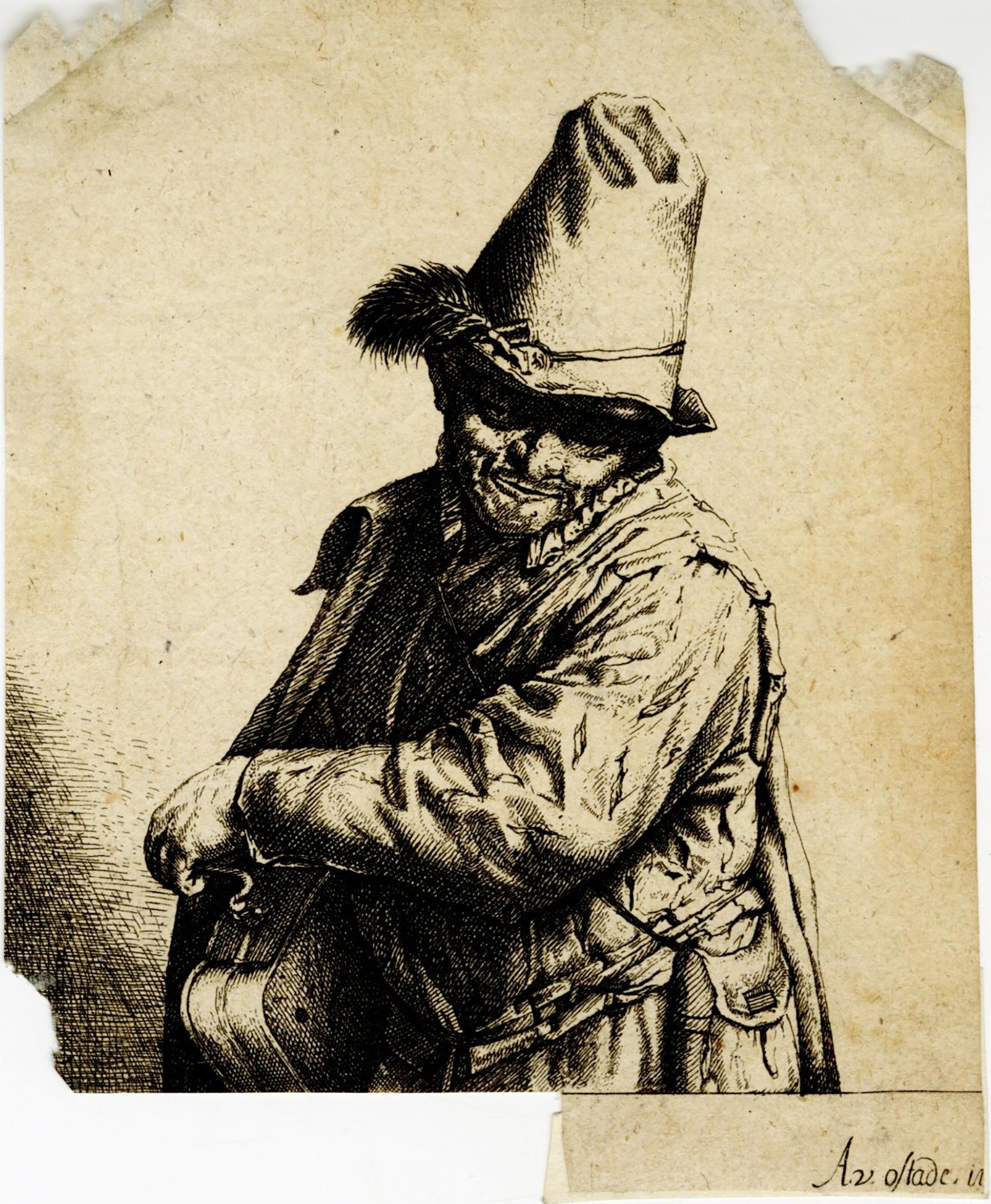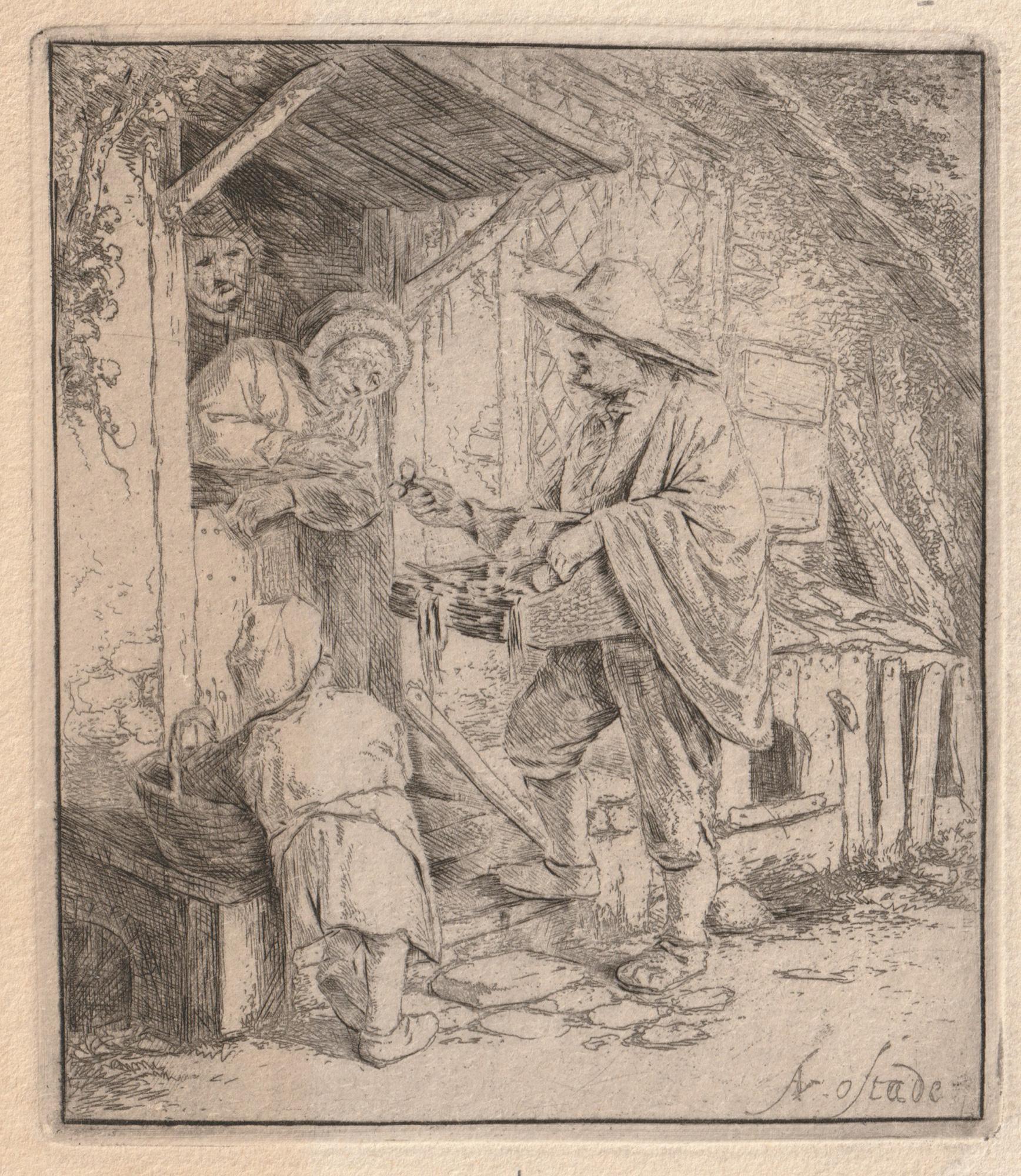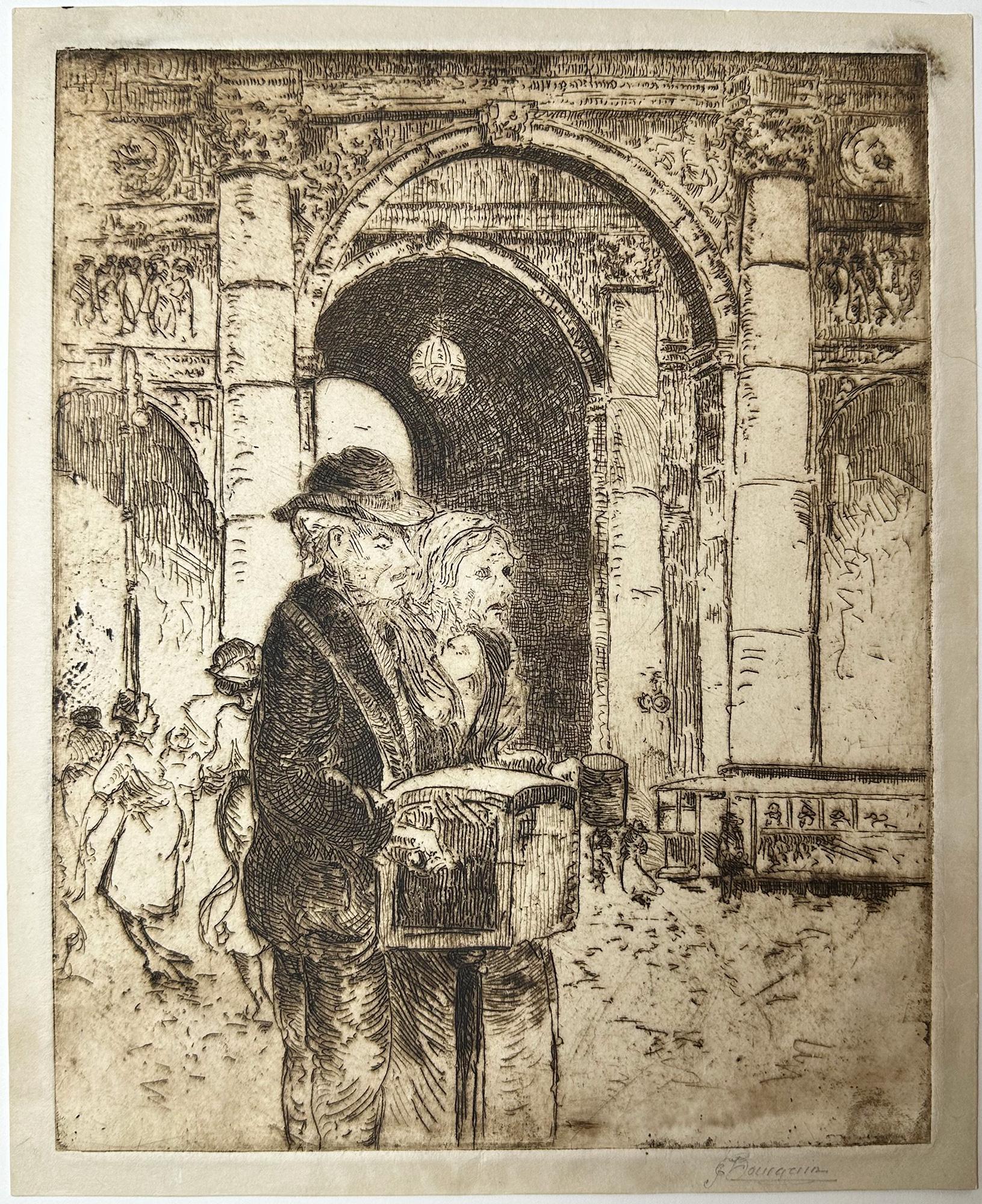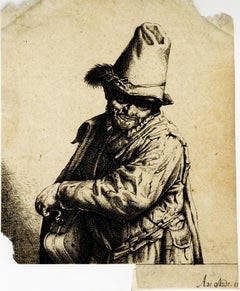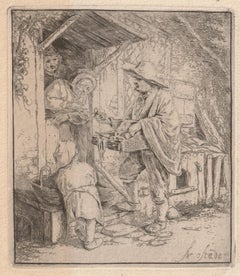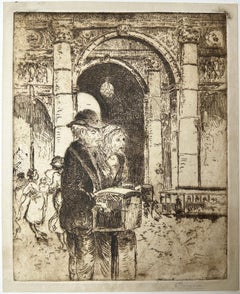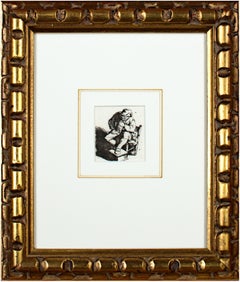Items Similar to The organ Grinder
Want more images or videos?
Request additional images or videos from the seller
1 of 8
Adriaen van OstadeThe organ Grinder1672
1672
$1,400
£1,066.57
€1,217.21
CA$1,967.33
A$2,144.04
CHF 1,135.36
MX$25,752.24
NOK 14,373.96
SEK 13,215.44
DKK 9,091.18
About the Item
Artist: Adriaen Van Ostade (Dutch, 1610-1685)
Title: The Organ Grinder
Year: 1647
Medium: Etching
Paper: Laid paper
Image (plate mark) size: 4.35 x 3.5 inches
Signature: Signed and dated in the plate as issue
Condition: Very good
Frame: Framed in a custom wooden black and gold frame with gold color bevel and fabric matting
Description: Fourth of five states. Catalogue raisonne by Godefroy, plate #8
- Creator:Adriaen van Ostade (1610 - 1685, Dutch)
- Creation Year:1672
- Dimensions:Height: 16.5 in (41.91 cm)Width: 15 in (38.1 cm)Depth: 1 in (2.54 cm)
- Medium:
- Movement & Style:
- Period:Late 17th Century
- Condition:
- Gallery Location:San Francisco, CA
- Reference Number:Seller: 113331stDibs: LU66632462163
About the Seller
5.0
Platinum Seller
Premium sellers with a 4.7+ rating and 24-hour response times
Established in 1999
1stDibs seller since 2017
869 sales on 1stDibs
Typical response time: <1 hour
- ShippingRetrieving quote...Shipping from: San Francisco, CA
- Return Policy
More From This Seller
View AllThe Smoker and the Drinker
By Adriaen van Ostade
Located in San Francisco, CA
Artist: Adriaen Van Ostade (Dutch, 1610-1685)
Title: The Smoker and the Drinker
Year: 1650
Medium: Etching
Paper: Laid paper
Image (plate mark) size...
Category
Late 17th Century Old Masters Figurative Prints
Materials
Etching
Smoker Leaning on the Back of a Chair
By Adriaen van Ostade
Located in San Francisco, CA
Artist: Adriaen Van Ostade (Dutch, 1610-1685)
Title: Smoker Leaning on the Back of a Chair
Year: 1672
Medium: Etching
Paper: Laid paper
Image size: 4.1 x 3.55 inches
Signature: Si...
Category
Late 17th Century Old Masters Figurative Prints
Materials
Etching
The couple
By Adriaen van Ostade
Located in San Francisco, CA
Artist: Adriaen Van Ostade (Dutch, 1610-1685)
Title: The Couple
Year : 1638
Medium: Etching
Paper: Laid paper
Image (plate mark): 3.25 x 2.5 inches
...
Category
Mid-17th Century Old Masters Figurative Prints
Materials
Etching
Pasquariello Truonno, Meo Squaquara
By Jacques Callot
Located in San Francisco, CA
Artist: Jacques Callot (French, 1592-1635)
Title: Pasquariello Truonno, Meo Squaquara
Year: 1622
Medium: Etching
Paper: Laid paper
Size of paper: 2.35 x 3.95 inches
Condition: Very g...
Category
17th Century Realist Figurative Prints
Materials
Etching
Self Portrait, Drawing at the Window
By Rembrandt van Rijn
Located in San Francisco, CA
Artist: Rembrandt Van Rijn (Dutch, 1606-1669)
Title: Self Portrait, Drawing at the Window
Year: 1648
Medium: Etching
Paper: Verge paper
Image (plate mark) size: 6.35 x 5.25 inch...
Category
Mid-17th Century Old Masters Figurative Prints
Materials
Etching
Cap. Cerimonia, Sig. Lauinia
By Jacques Callot
Located in San Francisco, CA
Artist: Jacques Callot (French, 1592-1635)
Title: Cap. Cerimonia, Sig. Lauinia
Year: 1622
Medium: Etching
Paper: Laid paper
Size of paper: 3.15 x 3.85 inches
Condition: Very good con...
Category
17th Century Realist Figurative Prints
Materials
Etching
You May Also Like
The Organ Grinder
By Adriaen van Ostade
Located in Middletown, NY
Etching on cream laid paper with a large heraldic watermark which is partially trimmed, 4 3/16 x 3 5/8 inches (105 x 84 mm), margins trimmed but preserving the signature in the lower...
Category
17th Century Old Masters Portrait Prints
Materials
Etching
The Spectacle Seller
By Adriaen Jansz van Ostade
Located in Middletown, NY
Etching and drypoint on cream laid paper, 4 x 3 3/8 inches (102 x 86 mm), 1/4 inch margins. Signed in the plate, lower left corner. The 3rd state (of 6), after the rounding of the pl...
Category
Mid-17th Century Old Masters Figurative Prints
Materials
Laid Paper, Drypoint, Etching
Organ Grinder and Beggar – French School 19th Century
Located in Middletown, NY
Drypoint etching and aquatint in sepia on cream wove paper, 10 x 8 inches (254 x 201 mm), full margins. Signed in pencil, lower left. Minor toning with evidence of very minor moistur...
Category
Mid-19th Century French School Portrait Prints
Materials
Handmade Paper, Laid Paper, Etching
'The Smoker (Le Fumeur)' original etching by Cornelis-Pietersz Bega
By Cornelis Bega
Located in Milwaukee, WI
'The Smoker (Le Fumeur)' is an original etching by the celebrated Dutch painter and printmaker Cornelis-Pietersz Bega. It presents a genre scene of the type Bega was best known for: Bega's principal subjects were genre representations of taverns, domestic interiors and villages. He depicted nursing mothers, prostitutes, drunks, gamblers and fools such as quack doctors and alchemists. In this case, he shows a man seated on a chair with his foot on a flat stool and holding a smoking pipe. For Bega, this representation was more of a caricature than it was an image of a specific person, and such genre scenes would have held allegorical and symbolic meaning for the seventeenth-century viewer. During the seventeenth century, the Dutch of all levels of society consumed tobacco and alcohol, and these were an important part of the Dutch economy and a major source of wealth. At the same time, however, moralists and ministers sought to curb intoxication: they openly described drinking and smoking as sinful, immoral, and a general threat to one’s reputation. This paradox is reflected in prints such as this, which inherently carry the national pride of the Dutch economy alongside a moral warning in a print that could be just as easily consumed and collected.
2.5 x 2.25 inches, print
12.38 x 10.38 inches, frame
Framed to conservation standards using archival materials including 100 percent rag matting and mounting materials. Housed in a gold finish Spanish-style wood moulding.
Overall good and stable condition; margins cut to plate; some wrinkling in the corners from previous mounting; housed in a new custom frame.
Cornelis Bega was born into prosperous circumstances. His mother, Maria Cornelis, inherited half the estate (gold, silver, paintings, drawings and prints) and all of the red chalk drawings of her father, Cornelis Cornelisz van Haarlem, a renowned Mannerist artist. Bega's father was Pieter Jansz Begijn (d 1648), a gold and silversmith.
Like other family members, Bega was probably Catholic. Houbraken's claim that Bega studied with Adriaen van Ostade is likely to be correct; this was probably before 24 April 1653, when Bega joined Vincent Laurentsz. van der Vinne in Frankfurt for a journey through Germany, Switzerland and France. Bega had returned to Haarlem by 1 September 1654, at which time he joined the Guild of St Luke; he was already a competent draughtsman, as indicated by his first extant dated work, Interior with a Nursing Mother (1652; Frankfurt am Main, Städel. Kstinst.), and by a remarkable double portrait (Amsterdam, Rijksmuseum) drawn by him and Leendert van der Cooghen in 1654.
Bega painted, drew, etched and made counterproofs in a wide variety of materials on different types of small-scale supports. He may have been the first Dutch artist to make monotypes, but this remains controversial. Approximately 160 paintings, 80 drawings and six monotypes by Bega have been catalogued, as well as around 34 etchings.
Bega's principal subjects were genre representations of taverns, domestic interiors and villages. He depicted nursing mothers, prostitutes, drunks, smokers, gamblers and fools such as quack doctors and alchemists. Less common subjects include the ridiculed or pestered woman, as in Two Figures and Mother with a Spirits Bottle (c. 1662; Gouda, Stedel, Museum Catharina Gasthuis) and The Inn (etching), as well as witty satires on traditional scenes of middle-class music-makers, such as the Music Lesson (1663; Paris, Petit Palace).
Bega's early paintings, such as the Weaver's Family (c. 1652; St Petersburg, Hermitage), are freely executed, dark and coarse, recalling the many-figured peasant subjects of van Ostade. Between c. 1660 and 1664 he began to paint genre scenes with fewer figures, which are finely articulated, colourful and psychologically expressive, for example Two Men Singing (1662; Dublin, N.G.). His exquisite, late fijnschilderen ('fine painting') manner, evident in The Alchemist (1663; Malibu, Getty Museum), compares well with that of Gerrit Dou.
As a draughtsman Bega is noted for his single-figure studies, executed mainly in black and white chalk on blue paper or red chalk on white paper. None of the studies, which were drawn naer het leven (from life), seem to relate to a painting or etching. Bega traded drawings or shared models with other artists of the Haarlem school, including van der Cooghen, Gerrit Berckheyde, Dirck Helmbreker and Cornelis Visscher. These artists drew chalk figure studies in a very similar style, characterised by regular and precise parallel shading and well-defined forms; their drawings, especially those of Bega and Berckheyde, have been frequently confused. Unlike the realistic figure studies, Bega's etchings depict interiors with figures or single figures in the manner of van Ostade; the compositions, often with masterful chiaroscuro effects, reflect most closely the paintings of the 1650s.
Bega is likely to have remained in Haarlem, where he paid dues to the Guild in 1661. He probably died from the plague; fees for his expensive funeral at St. Bavo's were paid on 30 August 1664. Among the artists he influenced were Thomas Wijck, Jan Steen, Richard Brakenburg (1650-1702) and Cornelis Dusart. Painters such as R. Oostrzaen ( fl ?1656) and Jacob Toorenvliet...
Category
17th Century Old Masters Figurative Prints
Materials
Paper, Etching
After Adriaen van Ostade (1610-1685) - 19th Century Oil, Hurdy-Gurdy Player
Located in Corsham, GB
A charming genre scene after Adriaen van Ostade (1610-1685) depicting travelling musicians, including a hurdy-gurdy player and a young violin player. Well presented in an ornate gilt...
Category
19th Century Figurative Paintings
Materials
Oil
The Quacksalver
By Adriaen van Ostade
Located in Middletown, NY
Etching on cream laid paper. 1/4 inch to 1/2 inch margins. In good condition with a band of minor discoloration along top and bottom sheet edge verso. One circular 1.5 inch- sized ar...
Category
Mid-17th Century Old Masters Figurative Prints
Materials
Laid Paper, Etching
More Ways To Browse
Black And Gold Frame
Antique Organs
Antique Grinder
Antique Organ Grinder
Picasso Ecuyere
Picasso Farol
Picasso Lithograph Bathers
Picasso Lithograph Couple
Picasso Marlborough
Picasso Pencil Signed
Picasso Plates Signed
Picasso Series 156
Picasso Toros Vallauris
Picasso Woman With Hat
Pierre Etienne Moitte
Piranesi Prints Carceri
Pop Shop 1
Poster Mardi Gras
